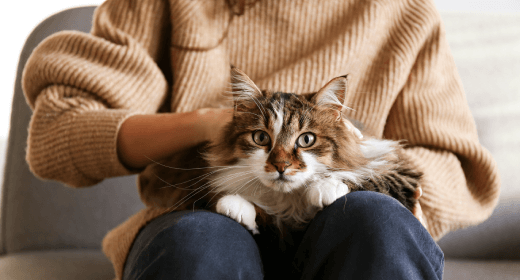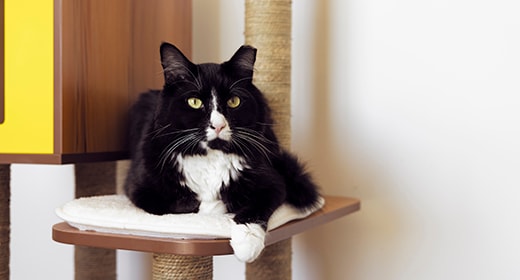

If you have ever indulged in a delicious piece of roasted chicken and noticed your furry friend giving you those irresistibly adorable, pleading eyes, you have probably wondered, 'Can cats eat chicken?'.
Chicken is a good source of protein, and you will find it as an ingredient in many commercial cat foods. However, there are some guidelines to follow. In this blog, we will uncover the delicious details about whether chicken is a friend or foe to our beloved furballs.
Is chicken good for cats? Well, when it comes to feline nutrition, chicken is often regarded as a favourite among our furry companions. Cats are obligate carnivores, which means that animal protein is essential for their overall health. Chicken, a lean and readily available source of protein, can offer several health benefits to your feline friend:
Chicken is a superb source of high-quality animal protein, which is essential for your cat's muscle development, growth, and overall body maintenance. Protein aids in tissue repair and supports a healthy coat.
Chicken is rich in essential amino acids, such as taurine, which is vital for cats. Additionally, taurine deficiency can lead to severe health issues, including heart problems and vision impairments.
Chicken contains essential vitamins and minerals like vitamin B6, niacin, phosphorus, and selenium. These nutrients contribute to your cat's overall well-being and help maintain a strong immune system.
Chicken has a naturally high moisture content, which can help keep your cat hydrated, especially if they are reluctant to drink water. Proper hydration is crucial for kidney health.
Most cats find chicken incredibly tasty, making it an excellent option for enticing picky eaters or cats with a diminished appetite.
While chicken can provide numerous health benefits to your cat, it should always be offered in moderation and as part of a balanced diet. Consult your veterinarian for guidance on the appropriate portion sizes and to ensure that chicken complements your cat's dietary needs.
If you have ever wondered whether it is safe to feed your cat raw chicken, be aware that it poses significant risks. Raw chicken, like other raw meats, can be contaminated with harmful. These pathogens can lead to severe gastrointestinal issues, including vomiting, diarrhoea, and even food poisoning in both cats and humans.
Additionally, when feeding your cat raw chicken increases the risk of nutrient imbalances and deficiencies, as it may lack essential nutrients that are destroyed during cooking.
To ensure your cat's safety, it is best to cook chicken thoroughly. Cooked chicken eliminates the risk of bacterial contamination and provides a safer and more digestible option for your feline friend.
Chicken bones, especially small and brittle ones like those in wings or drumsticks, can pose serious health risks to cats. Unlike dogs, cats have a more delicate digestive system and cannot process bones safely. When cats chew on or swallow bones, they can:
Small bones can get logged in a cat's throat, causing choking, gagging, or even airway obstruction.
Chicken bones can splinter into sharp pieces, which may damage a cat's mouth, throat, or digestive tract.
Bone fragments can create blockages in the gastrointestinal tract, leading to painful and life-threatening conditions.
Sharp bone fragments can puncture a cat's intestines or stomach, causing internal injuries and infections.
To keep your cat safe, always remove bones from chicken before offering it to them. Offer boneless, cooked chicken as an occasional treat, but ensure that it is free of seasonings, spices, and any potentially harmful ingredients.
Cats are known for their carnivorous cravings, but before you toss that raw chicken their way, hold your whiskers! While it might seem like a natural choice, there are some serious risks involved. Let's take a bite-sized look at what you need to know.
Raw chicken can be a breeding ground for nasty characters like Salmonella and Campylobacter. These troublemakers can cause a real bellyache for both your cat and you. Even if your feline friend does not show symptoms, they could pass these pathogens along to you, especially if you have got a delicate immune system. A real 'no-thank-you' dish!
Cooked or uncooked chicken bones can splinter into shards of trouble. These bone bits can wreak havoc on your cat's insides, causing choking, punctures, or blockages. To stay on the safe side, opt for boneless chicken or consider a vet-approved alternative.
Chicken is a protein powerhouse, but it is not the only game in town. Feeding your cat only raw chicken could lead to a dietary disaster. It is missing some crucial nutrients that your feline friend needs for a balanced diet. To keep their tails wagging, consult with a vet or feline nutrition guru to whip up a menu that is both tasty and nutritious.
When it comes to preparing raw chicken for your feline companion, a few key considerations can make all the difference in ensuring a safe and healthy meal:
Freshness is paramount. Check the sell-by date, and inspect the chicken for any signs of spoilage, such as an unusual odour or discoloration. Cats, like us, prefer their meals fresh and free from any hints of spoilage.
Handle raw chicken with care. Ensure your cutting board, knives, and utensils are clean and sanitized to prevent cross-contamination. Keeping a dedicated cutting board for cat food prep can help maintain hygiene.
Rinse the chicken thoroughly under cold water to remove any debris and pat it dry with a clean paper towel. This step helps minimise the risk of bacterial contamination, keeping your cat's meal safe and healthy.
While chicken can offer benefits to cats, it is important to remember a few key points. Always opt for cooked, boneless chicken in moderation, as raw chicken carries health risks due to bacterial contamination and nutrient imbalances. Furthermore, never offer chicken bones to cats, as they can be harmful.
Prioritising freshness and maintaining proper hygiene when preparing chicken for your cat is essential to ensure its safety and well-being. If you have any doubts or need guidance, consulting a veterinarian or a nutrition expert can help you provide a balanced and secure diet for your feline friend. Moreover, to avoid any safety and dietary concerns, why not go for IAMS cat food? With chicken as the first ingredient, our range of cat food is developed to meet your cat’s day-to-day nutrition quota.
Yes, it is generally safe to feed your cat cooked chicken as long as it is plain, unseasoned, and boneless. Avoid using any spices, herbs, or cooking oils that might be harmful to cats.
Kittens can eat chicken, but it should be cooked and cut into small, manageable pieces. Ensure it is boneless to prevent choking hazards, and it can be a part of a balanced kitten diet.
Boiled chicken for cats is a nutritious and easily digestible option, especially if they have digestive issues. However, it should still be boneless and served plain without any seasonings or additives.
Yes, cats can eat chicken hearts and liver in moderation. These organ meats are a good source of essential nutrients for cats. However, they should be cooked and fed as part of a balanced diet rather than as the sole food source to avoid nutritional imbalances.


Cats are generally considered to be low-maintenance pets. However, that’s nothing but a myth. You need to care for a cat the way you would care for any baby, especially with regards to its health and overall well-being. Although medical treatments are available for most feline illnesses, prevention is always better than cure. Cat vaccinations, such as the anti-rabies and FVRCP vaccine, protect your furry friends from deadly infections like rabies. But did you know? These diseases are transmissible to humans as well. Yes. So, when you vaccinate your cat against such medical conditions, you also reduce the possibility of contracting fatal diseases from your own pet.
Feline vaccines are scientifically developed to boost the cat’s immunity and fight fatal diseases. Even though there is no ‘one size fits all’ protocol for immunization, veterinarians suggest cat injections depending on your pet’s age, overall health, lifestyle, and breed. Moreover, these vaccinations are primarily divided into two categories – core vaccines and lifestyle vaccines. Core vaccines are essential for every cat irrespective of their lifestyle, breed, and region. Lifestyle vaccines are given to cats after considering certain circumstances.
Administering rabies and other precautionary vaccines from a young age protects cats from falling prey to serious diseases. Mentioned below are essential cat vaccinations that every kitty must get:
These are anti-rabies vaccines for cats. They are given annually or once in 3 years – depending on the type of vaccine you choose – to protect your kitty from the fatal rabies virus. While this disease is fatal for your feline friend, it can also prove terminal for humans. Rabies often spreads through bites or scratches of infected animals. And rabies patients develop signs of aggression, disorientation, and hydrophobia post incubation stage. If not treated in time, rabies often results in fatal consequences for both animals and humans. Hence, anti-rabies vaccines for cats are a must from a young age.
These are 3-in-1 vaccine for cats. FVRCP vaccine prevents cats from three different viruses – feline rhinotracheitis virus, calicivirus, and feline panleukopenia virus. Instead of getting the kitten inoculated three times, you can simply get the FVRCP vaccine. This 3-in-1 vaccine for cats is recommended annually to protect them from highly infectious diseases.
Protect your kitty from leukemia virus by getting them vaccinated. This disease can spread through body fluids like urine, saliva, and feces; hence, FeLV infects cats while grooming or sharing a bowl with an infected cat. This fatal virus can process into various associated conditions such as anemia, lymphoma, or immunosuppression. Hence, the FeLV vaccine is recommended for cats from a very young age. This vaccine consists of two doses spaced three to four weeks apart for kittens and is followed by revaccination a year later for adult cats.
An FPV vaccine also protects your cat from feline panleukopenia. Kittens should receive an FPV shot once they turn 6-8 weeks old. You should also revaccinate your four-legged angel every three to four weeks until the age of 16 weeks. After this, a booster dose should be given between the ages of 1 to 2 years.
Developed to combat 4 diseases, 4-in-1 vaccine for cats protect against rhinotracheitis, calicivirus, panleukopenia, and chlamydia. These 4 in 1 cat vaccine are also called 4-way vaccines or FVRCCP. Feline chlamydia is part of the feline upper respiratory complex and an underlying cause of most early ocular infections. Hence, kittens should receive 4-in-1 vaccine for cats at the age of 8, 12, and 16 weeks, and a revaccination once they turn a year old. Cat parents are also suggested to revaccinate their kitty every 3 years to keep their purrfect pal hale and hearty.
F5 or Fevac 5 vaccines are 5-in-1 vaccine for cats that boosts your kitty’s immune system to tackle five viruses. Getting your kitty inoculated for this combination will ensure that it is safe from a range of fatal illnesses.
Vaccines are built to boost immunity and fight deadly illnesses. However, after getting vaccinated, your kitty might show mild signs of discomfort and other symptoms. These signs and symptoms are nothing but proof that its body is building a defense mechanism to defeat deadly viruses. Side effects of anti-rabies, FVRCP vaccine, or other combination vaccines for cats may include the following symptoms:
Lethargy
Loss of appetite
Vomiting
Fever
Diarrhea
Ensuring that your feline friend is vaccinated from time to time aids in keeping them healthy and lively. Hence, every cat parent is recommended to plan a proper vaccination schedule for their fur babies.